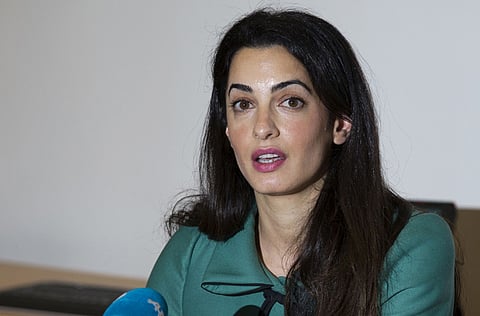Amal faces a very different engagement in Libya trial
Clooney’s fiancee is fighting to be able to defend Muammar Gaddafi’s enforcer

London
Amal Alamuddin was pictured across the world last month after the announcement of her engagement to George Clooney after a whirlwind romance. Soon she could return to the front pages in a more controversial role - when she stands up in court to represent Muammar Gaddafi’s notorious spy chief in a case that could scupper the reputation of the international criminal court.
Abdullah Al Sanussi is no one’s idea of a poster boy for justice. As Gaddafi’s intelligence chief and right-hand man for four decades, the 64-year-old supervised torture, assassinations and town-square hangings.
Many Libyans blame him for the massacre of 1,200 inmates at Tripoli’s Abu Salem prison, a Paris court has convicted him in absentia for the bombing of a French airliner in 1989, and Scottish police are to interview him over allegations of masterminding the Lockerbie bombing. He fled Libya during the 2011 Arab spring revolution, but was caught in Mauritania and returned to Libya. And that is where the trouble began.
Charges
Al Sanussi was charged along with Gaddafi’s playboy son, Saif Al Islam, with war crimes and crimes against humanity by the ICC.
Under the rules of the United Nations, which ordered the case, The Hague court was to hold the trial unless Libya could prove itself capable of doing the job itself. In October, Libya was given that approval, despite allegations that Al Senussi had been mistreated, and Libya’s refusal to let Amal or any of his ICC-appointed defence team visit him, which she says should have been a red flag to The Hague.
“A scary precedent has been set,” she told the Observer. “The ICC made its decision despite the fact that Libya did not allow us a single visit to [Al] Sanussi.”
Considered a high-flier in the close-knit world of international lawyers, Amal was hired for the case by Ben Emmerson QC, with whom she had already worked defending the WikiLeaks founder, Julian Assange.
Tough lawyer
Born in Beirut to a journalist mother and travel agent father, the 36-year-old barrister had already gained a high profile as an adviser to former UN secretary general Kofi Annan and was picked by William Hague for a panel investigating rape as a war crime.
Sources at her chambers in Doughty Street, London, say she is a tough, combative lawyer with experience gained as a prosecutor on the UN’s Lebanon war crimes tribunal. When she failed to get a visa for Libya, or even permission to speak to her client by phone, she sought out Al Sanussi’s daughter, Anoud, who was kidnapped and jailed in Tripoli after visiting her father in prison, and later fled to London.
Al Sanussi’s appeal hearing against The Hague’s decision to back Libya cuts to the very heart of what the ICC is supposed to be. Conceived as a “world court”, its mission is to set a benchmark for global justice. In backing Libya, that reputation stands to be badly tarnished.
“The whole point of the ICC is to be there when national systems can’t do the job, said Alamuddin. “Instead, it is giving a flawed, dangerous process the stamp of approval.”



